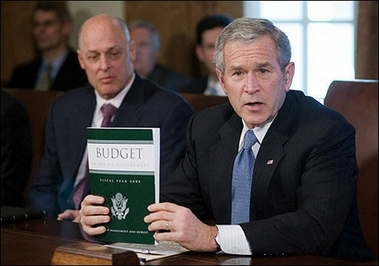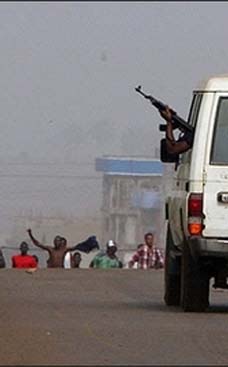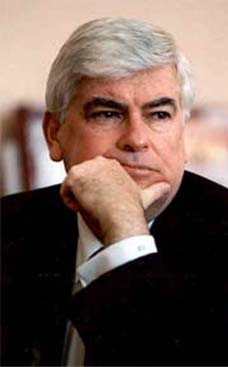2007.02.05: February 5, 2007: Headlines: Presidents - Bush: Budget: Appropriations: USINFO: White House requests $334 Million for Peace Corps for FY2008
Peace Corps Online:
Peace Corps News:
Peace Corps Library:
Appropriations:
January 23, 2005: Index: PCOL Exclusive: Appropriations :
2007.02.05: February 5, 2007: Headlines: Presidents - Bush: Budget: Appropriations: USINFO: White House requests $334 Million for Peace Corps for FY2008
White House requests $334 Million for Peace Corps for FY2008

President Bush has sent Congress a proposed $20.3 billion budget for foreign assistance during fiscal year 2008, which begins October 1. Under the proposal, the Peace Corps would receive $334 million. Last year Bush proposed $337 Million for Peace Corps for FY2007 and Congress appropriated $325 Million. Five years ago Bush proposed doubling the size of the Peace Corps by 2007.
White House requests $334 Million for Peace Corps for FY2008
Budget Plan Includes Increase for Millennium Challenge Aid
$3 billion sought for program in fiscal year that starts October 1
By Kathryn McConnell and Jon Schaffer
USINFO Staff Writers
Caption: US President George W. Bush holds a copy of the 2008 Fiscal Budget during a meeting with his cabinet as Treasury Secretary Henry Paulson (L) looks on in the Cabinet Room of the White House. Bush presented the US Congress with a mammoth 716.5 billion dollar budget request to fund large US military, including its missions in war-torn Iraq and Afghanistan .(AFP/Mandel Ngan)
Washington -- President Bush has sent Congress a proposed $20.3 billion budget for foreign assistance during fiscal year 2008, which begins October 1.
The funding request is part of the presidentís $2.9 trillion budget plan submitted to Congress February 5. Congress must approve the presidentís proposals and can modify the specific amounts requested. In turn, the president must approve the final appropriations bills that Congress passes.
The budget proposal calls for $3 billion for the Millennium Challenge Corporation (MCC) for promoting sustainable economic growth and reducing poverty in some of the world's poorest countries.
MCC Chief Executive Officer John Danilovich, in a statement, said an increase is warranted. In fiscal year 2007, Congress allocated $1.8 billion for the three-year-old MCC program.
"We now have 11 compacts and 11 threshold programs in place totaling $3.3 billion," Danilovich said. The threshold program helps countries become eligible for longer-term compacts, or agreements for results-oriented, multiyear projects.
An inability to respond to proposals from partner countries because of funding cuts, he said, would "undermine, perhaps irreparably, the incentive MCC assistance provides to countries to enact major political, social and economic reforms."
Speaking a the Center for Strategic and International Studies the same day, Randall Tobias, director of U.S. foreign assistance, said the fiscal 2008 budget proposal provides for a 20 percent increase in resources for low- and lower-middle-income countries over 2006 levels and a 54 percent increase in assistance to Africa. (See related article.)
"There's a 4 percent increase for the Near East as a vital investment in winning the global War on Terror and empowering the people of this critical region," he said. "There's a 6 percent increase in South and Central Asia, highly concentrated in states like Afghanistan and Pakistan, which are of critical importance to our national security and are also among the very poorest nations in that region."
Since President Bush took office, Tobias said, aid to Western Hemisphere countries will have increased, from $862 million to $1.66 billion if the current foreign assistance budget requested is approved by Congress.
HEALTH INITIATIVES
The overall request proposes $4.2 billion for HIV/AIDS treatment, prevention and care activities in 15 African nations and an additional $1.2 billion for AIDS programs worldwide. Overall, it would expand the number of people in Africa and the Caribbean receiving live-saving treatment for HIV/AIDS to 2 million by 2009, and contribute to AIDS research and multilateral partner organizations.
The request, if approved by Congress, would continue the President's Malaria Initiative for Africa and includes $300 million to reduce malaria deaths by 50 percent in 15 targeted countries in Africa and to fund ongoing malaria programs around the world.
The proposed budget calls for $1.5 billion for child survival and health programs worldwide.
It includes $2.4 billion for programs that support economic growth and poverty reduction, and $2.3 billion for humanitarian assistance and for responding to humanitarian disasters.
Funding to fight narcotics in the Andean countries would be $443 million.
DEMOCRATIC TRANSITIONS
Programs that foster democratic transitions -- through independent media, pluralistic political parties, and voter education and election monitoring -- and that promote rule of law, good governance and human rights in nondemocratic nations would be funded at $1.45 billion.
It proposes $486 million for educational and cultural exchanges and $359 million for public diplomacy programs to foster mutual understanding between the United States and other countries and to combat terrorism.
Under the proposal, the Peace Corps would receive $334 million.
Multilateral development banks would get a boost to $1.5 billion.
The proposed budget calls for $1.3 billion for food aid.
Africa would receive a total of $4.4 billion in aid funding.
A fact sheet on the foreign aid budget request and a transcript of Tobias' speech are available on the State Department Web site.
(USINFO is produced by the Bureau of International Information Programs, U.S. Department of State. Web site: http://usinfo.state.gov)
Links to Related Topics (Tags):
Headlines: February, 2007; Presidents - Bush; Budget; Appropriations
When this story was posted in February 2007, this was on the front page of PCOL:





Peace Corps Online The Independent News Forum serving Returned Peace Corps Volunteers
 | Ron Tschetter in Morocco and Jordan
On his first official trip since being confirmed as Peace Corps Director, Ron Tschetter (shown at left with PCV Tia Tucker) is on a ten day trip to Morocco and Jordan. Traveling with his wife (Both are RPCVs.), Tschetter met with volunteers in Morocco working in environment, youth development, health, and small business development. He began his trip to Jordan by meeting with His Majesty King Abdullah II and Her Majesty Queen Rania Al Abdullah and discussed expanding the program there in the near future. |
 | Chris Dodd's Vision for the Peace Corps
Senator Chris Dodd (RPCV Dominican Republic) spoke at the ceremony for this year's Shriver Award and elaborated on issues he raised at Ron Tschetter's hearings. Dodd plans to introduce legislation that may include: setting aside a portion of Peace Corps' budget as seed money for demonstration projects and third goal activities (after adjusting the annual budget upward to accommodate the added expense), more volunteer input into Peace Corps operations, removing medical, healthcare and tax impediments that discourage older volunteers, providing more transparency in the medical screening and appeals process, a more comprehensive health safety net for recently-returned volunteers, and authorizing volunteers to accept, under certain circumstances, private donations to support their development projects. He plans to circulate draft legislation for review to members of the Peace Corps community and welcomes RPCV comments. |
 | He served with honor
One year ago, Staff Sgt. Robert J. Paul (RPCV Kenya) carried on an ongoing dialog on this website on the military and the peace corps and his role as a member of a Civil Affairs Team in Iraq and Afghanistan. We have just received a report that Sargeant Paul has been killed by a car bomb in Kabul. Words cannot express our feeling of loss for this tremendous injury to the entire RPCV community. Most of us didn't know him personally but we knew him from his words. Our thoughts go out to his family and friends. He was one of ours and he served with honor. |
 | Peace Corps' Screening and Medical Clearance
The purpose of Peace Corps' screening and medical clearance process is to ensure safe accommodation for applicants and minimize undue risk exposure for volunteers to allow PCVS to complete their service without compromising their entry health status. To further these goals, PCOL has obtained a copy of the Peace Corps Screening Guidelines Manual through the Freedom of Information Act (FOIA) and has posted it in the "Peace Corps Library." Applicants and Medical Professionals (especially those who have already served as volunteers) are urged to review the guidelines and leave their comments and suggestions. Then read the story of one RPCV's journey through medical screening and his suggestions for changes to the process. |
 | The Peace Corps is "fashionable" again
The LA Times says that "the Peace Corps is booming again and "It's hard to know exactly what's behind the resurgence." PCOL Comment: Since the founding of the Peace Corps 45 years ago, Americans have answered Kennedy's call: "Ask not what your country can do for you--ask what you can do for your country. My fellow citizens of the world: ask not what America will do for you, but what together we can do for the freedom of man." Over 182,000 have served. Another 200,000 have applied and been unable to serve because of lack of Congressional funding. The Peace Corps has never gone out of fashion. It's Congress that hasn't been keeping pace. |
 | PCOL readership increases 100%
Monthly readership on "Peace Corps Online" has increased in the past twelve months to 350,000 visitors - over eleven thousand every day - a 100% increase since this time last year. Thanks again, RPCVs and Friends of the Peace Corps, for making PCOL your source of information for the Peace Corps community. And thanks for supporting the Peace Corps Library and History of the Peace Corps. Stay tuned, the best is yet to come. |
 | History of the Peace Corps
PCOL is proud to announce that Phase One of the "History of the Peace Corps" is now available online. This installment includes over 5,000 pages of primary source documents from the archives of the Peace Corps including every issue of "Peace Corps News," "Peace Corps Times," "Peace Corps Volunteer," "Action Update," and every annual report of the Peace Corps to Congress since 1961. "Ask Not" is an ongoing project. Read how you can help. |
Read the stories and leave your comments.

Some postings on Peace Corps Online are provided to the individual members of this group without permission of the copyright owner for the non-profit purposes of criticism, comment, education, scholarship, and research under the "Fair Use" provisions of U.S. Government copyright laws and they may not be distributed further without permission of the copyright owner. Peace Corps Online does not vouch for the accuracy of the content of the postings, which is the sole responsibility of the copyright holder.
Story Source: USINFO
This story has been posted in the following forums: : Headlines; Presidents - Bush; Budget; Appropriations
PCOL36089
04



















